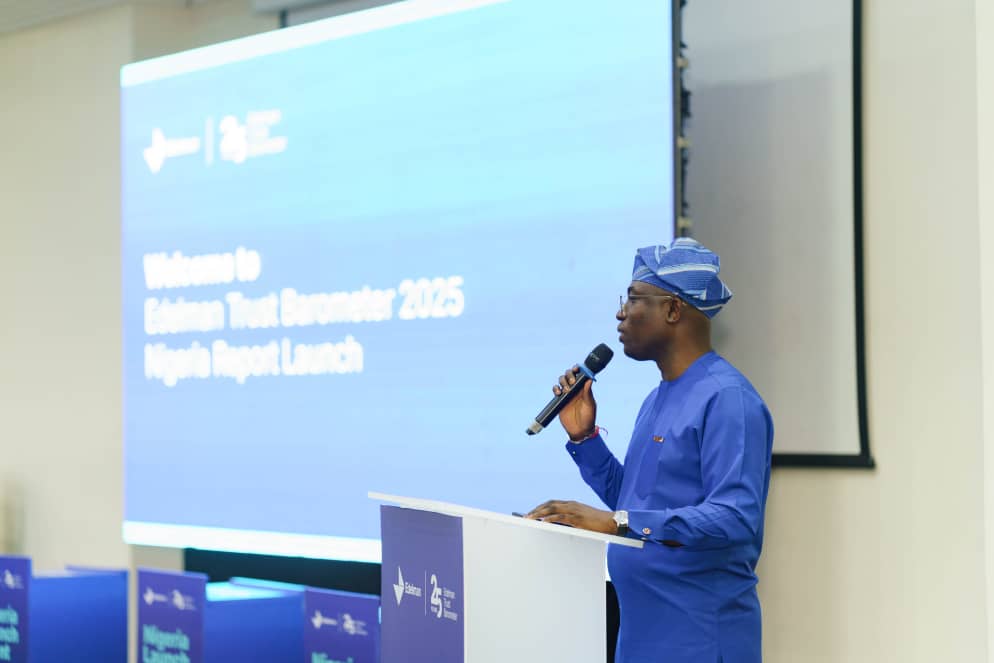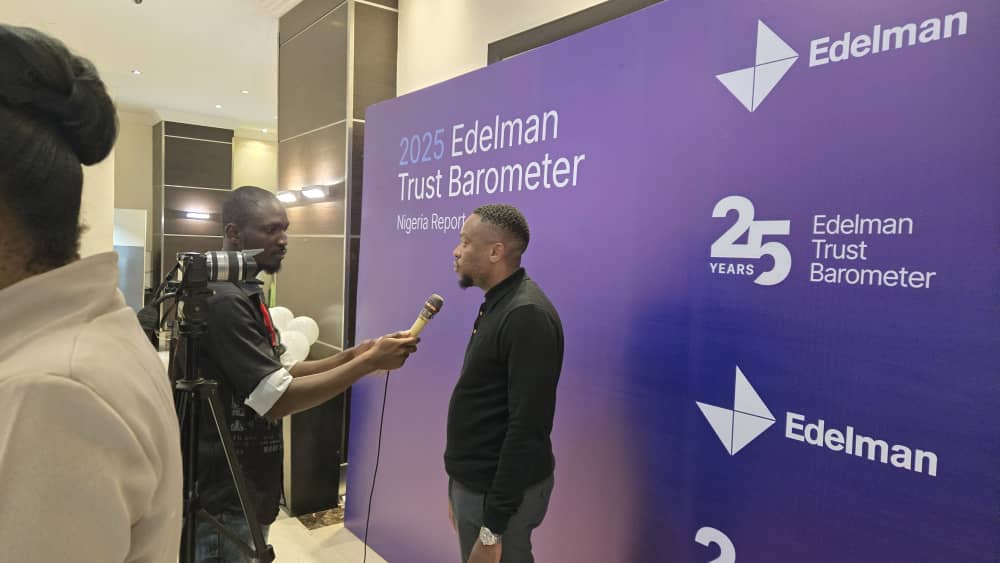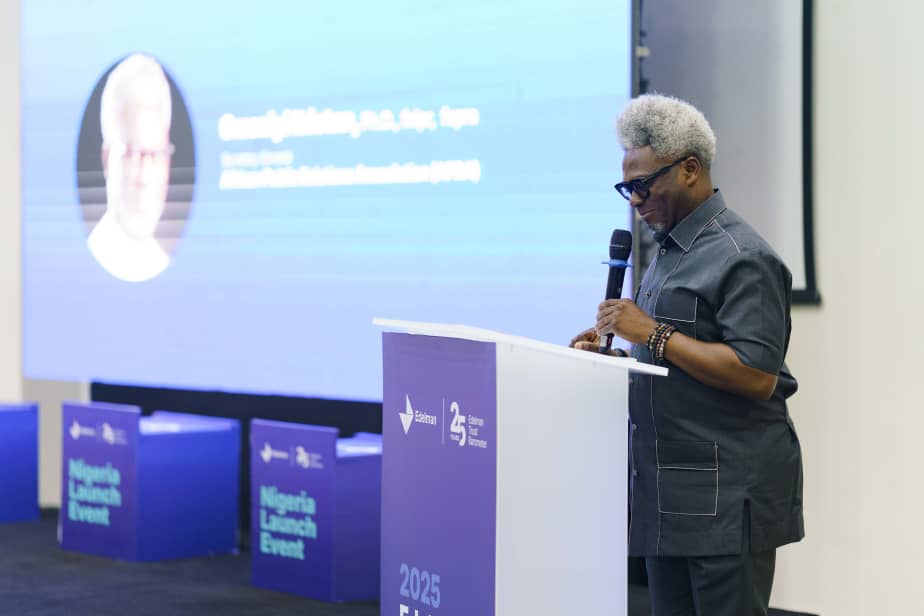Trust, Grievance, and the Business Imperative: A Call to Action for Nigeria’s Leaders

Kwame Senou, Executive Director at THOP during the public presentation of the 2025 Edelman Trust Barometer Nigeria Edition at the FourPoints Sheraton Hotel, Lagos recently.
The 2025 Edelman Trust Barometer delivers a stark yet compelling message: trust in Nigeria’s institutions – business, government, media, and NGOs – has increased to a Trust Index score of 65, up 4 points from the previous year. In an era of scepticism, this growth is a testament to the resilience of institutions. But this is not the time for complacency.
Beneath this progress lies a more complex reality.
Titled The 2025 Edelman Trust Barometer Nigeria Report: Trust and the Crisis of Grievance, the report paints a picture of a deep sense of grievance and economic anxiety among Nigerians.
Concerns over job loss due to foreign competition have escalated among employees, rising by nine points from the previous year to reach 67%. Fears of job insecurity due to automation have also surged by eight points, now standing at 70% among employees, signalling growing apprehension about job displacement and job security.
“These anxieties contribute to a pervasive sense of grievance, with 72% of Nigerians having a moderate or higher sense of grievance, believing that business, government, and the affluent primarily serve a select few, perpetuating systemic inequities. Such sentiments erode trust and hinder societal progress and must be addressed head-on,” says Chief Executive Officer at Edelman Africa, Karena Crerar.
The erosion of trust extends to leadership itself: 7 in 10 Nigerians worry that government officials, business leaders, and journalists each intentionally mislead the public. This crisis of credibility threatens the foundation of both economic and social stability.
A License to Act
At least one third of Nigerians demand more action from business, not less, to address issues such as climate change, discrimination, affordability, misinformation, and retraining – and believe that business is not going far enough to address these issues. Leaders can no longer afford to view social challenges as being outside of their remit.
As such, CEOs are being called on to act, as Nigerians believe they are justified in addressing social issues. For those with a high sense of grievance, 89% believe CEOs are justified in addressing a societal issue if they could make a major impact on the challenge, and 80% say they are justified if doing so would improve business performance.

2025 Edelman Trust Barometer (25th edition) Keynote Speaker, Wandile Cindi, Senior strategist and Reputation Advisor, Edelman Africa.
CEOs are also justified in addressing societal issues if their business contributed to the problem, say 74% of those with a high sense of grievance, or if the issue harms their customers, employees or communities (79% on average across the three).
To ensure a better future, Nigerians agree the business sector in Nigeria is further obligated to nurture workplace civility to facilitate discussions about contentious issues.
A Rallying Call Against Hostile Activism
Crerar states: “Alarmingly, over half of the population, 52%, view hostile activism – including online attacks, disinformation, and/or property damage – as viable methods to effect change. This statistic should serve as a clarion call for all institutional leaders to address underlying grievances proactively.”
The report explains that grievances undermine confidence in the business sector’s competence and ethics.
However, Nigerians still recognize the sector’s role in economic empowerment. For those with a high sense of grievance, 92% say that business is obligated to provide good paying jobs in local communities. And 86% of those whose sense of grievance is high believe business is obligated to train or reskill employees.
Nigerians are more optimistic than their global counterparts, with 50% believing that compared to today, future generations will be better off. In most developed countries, less than 1 in 5 respondents believe that.
Working Together to Build Trust
However, all institutions must work together to build trust.
The report calls on business, government, media, and NGOs to work together to address the root causes of grievance and enable trust, growth, and prosperity.
This means investing in local communities, providing accurate information, and equipping individuals with job skills that drive economic mobility. Delivering results that benefit all stakeholders fairly is crucial.
The report aptly notes: “The institutional failures of the past 25 years have fuelled grievances worldwide, stifling growth and innovation. To navigate this crisis, leaders must understand the economic realities of their stakeholders, champion shared interests, and create opportunities for optimism.”
Other Key Findings:
The fear of being discriminated against through prejudice, discrimination, or racism grew by 9 points from 2024, reaching 75%.
The fear was particularly marked among men, which rose to 74% – an 11-point increase from the previous year, and those with high income at 85%, recording a whopping 22-point increase.
In line with the global decline in Employer trust, while Nigerian employees’ trust remained high for employers to do what’s right, 80%.
74% of Nigerians believe that the wealthy’s selfishness causes many of our problems.

African Public Relations Association (APRA) president, Arik Karani was represented at the event by the Association’s Secretary General, Mr. Omoniyi Ibietan, Ph.D., fnipr.
Edelman is a global communications firm that partners with businesses and organisations to evolve, promote and protect their brands and reputations. With 6,000 employees across over 60 offices, Edelman develops communication strategies that build client confidence and stakeholder trust. The firm boasts an array of accolades, including PRWeek’s Agency Dynasty of the Past 25 Years and Global Agency of the Year (2023) and Cannes Lions Independent Agency of the Year for the Good Track (2024 & 2022). Recognised as a standout agency by AdAge (2023) and honored with multiple Cannes Lions, including Titanium, Grand Prix and seven Gold Lions since 2021, Edelman consistently sets the industry standard. Since our founding in 1952, we have remained an independent, family-run business. Edelman owns specialty companies Edelman Data x Intelligence (research, data), Edelman Smithfield (financial communications), and UEG (entertainment, sports and lifestyle).
The 2025 Edelman Trust Barometer is the firm’s 25th annual trust survey. The research was produced by the Edelman Trust Institute and consists of 30-minute online interviews conducted between October 25 and November 16, 2024. The 2025 Edelman Trust Barometer surveyed more than 33,000 respondents across 28 countries.
Published every January, the report covers a range of timely and important societal indicators of trust among business, media, government and NGOs, shaping conversation and setting the agenda for the year ahead.









